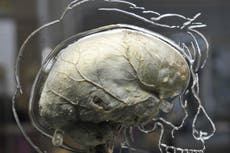This Chinese martial art may slow down Parkinson’s disease
Study shows Tai Chi can have long-term beneficial effects on Parkinson’s disease
Practicing one particular Chinese martial art could help curb symptoms and complications of Parkinson’s disease for several years, according to a new study.
Regular practice of Tai Chi, which involves sequences of very slow controlled movements, is linked with slower progression of the debilitating neuro-degenerative condition, with patients likely to require lower doses of drugs over time, according to the research published in the Journal of Neurology Neurosurgery & Psychiatry.
Parkinson’s disease is a progressive disorder affecting nerves and muscles, characterised by slowness of movement, resting tremor and stiff and inflexible muscles.
It is the fastest growing neurological condition in the world, with two people in the UK diagnosed with the disease every hour, according to Parkinson’s UK.
There are still no cures for the condition and while drugs can improve symptoms, they don’t treat all manifestations of the disease.
Previous research had hinted that Tai Chi may have some positive effects on Parkinson’s patients, but whether this can be sustained over a long term isn’t known.
In the new study, scientists, including those from Shanghai Jiao Tong University in China, monitored two groups of patients with Parkinson’s disease for more than five years from January 2016 to June 2021.
Disease severity, medication use, age and education level were found to be similar in both the groups.
One group of 147 patients practised Tai Chi twice a week for an hour, while another group of 187 patients continued with their standard care, but didn’t practise the martial art.
Doctors monitored disease severity and progression in all the participants as well as their increases in the need for medication at the start of the monitoring period and in November 2019, October 2020 and June 2021.
The extent of movement, mood, sleep quality and cognition as well other symptoms like the prevalence of complications like involuntary movement (dyskinesia), abnormal muscle tone (dystonia), hallucinations and restless leg syndrome were also tracked.
Scientists found that disease progression was slower at all monitoring points in the Tai Chi group, as assessed by three validated scales to assess overall symptoms, movement and balance.
They also found that the number of patients who needed to increase their medication in the comparison group was “significantly higher” than it was in the Tai Chi group.
Researchers said cognitive function deteriorated more slowly in the Tai Chi group, while sleep and quality of life also continuously improved.
However, scientists acknowledge that the study is observational and can’t establish cause and effect.
Citing another limitation of the research, they said the number of study participants was relatively small.
“Our study has shown that Tai Chi retains the long-term beneficial effect on [Parkinson’s disease], indicating the potential disease-modifying effects on both motor and non-motor symptoms, especially gait, balance, autonomic symptoms and cognition,” scientists concluded.
Join our commenting forum
Join thought-provoking conversations, follow other Independent readers and see their replies
Comments


Bookmark popover
Removed from bookmarks